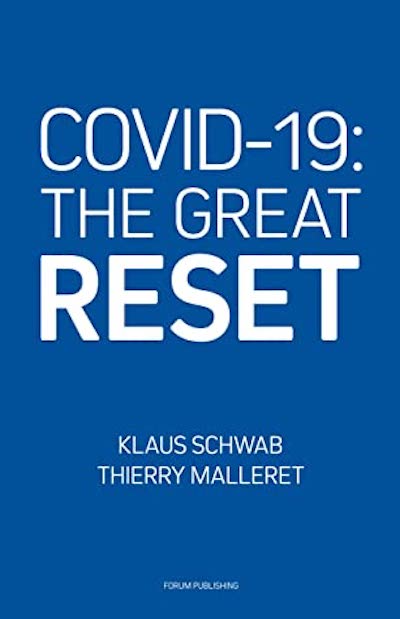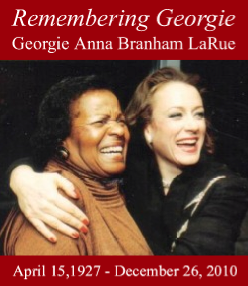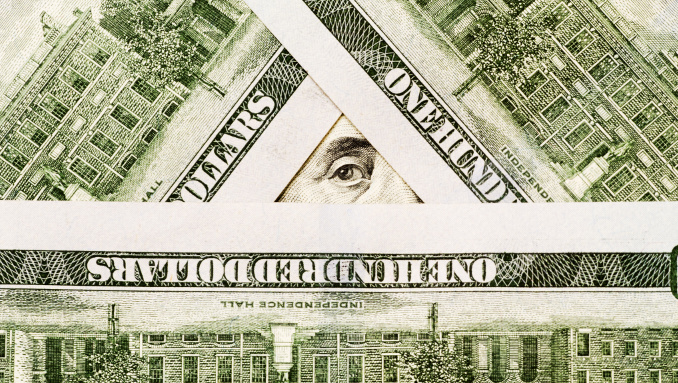“In Russia we only had two TV channels. Channel One was propaganda. Channel Two consisted of a KGB officer telling you: Turn back at once to Channel One.” ~ Yakov Smirnoff
By Catherine Austin Fitts
Professor Klaus Schwab founded and runs the World Economic Forum in Davos, Switzerland. The Forum’s tag line is “committed to improving the state of the world,” which it does by gathering global leaders together at its annual meeting and encouraging ongoing conversations about important issues and problems. As a global group, it has made a concerted effort to foster open conversations through its website and other media.
The Forum has made a significant effort during 2020 to market the central bankers’ global reset to a non-financial audience. In a nutshell, the Forum’s vision says that Covid-19 is a serious global health crisis that gives us the opportunity to reset our way of living to address the dire consequences of climate change and various global problems. It speaks eloquently of the opportunity for young people to embrace these changes. To my knowledge, it does not address the nuts and bolts or risks of transhumanism or technocracy and where these are likely to lead. (I confess I have not plumbed the depths of their extensive reset website.) It is, essentially, a soft sell for supporting the effort to dismantle human divinity and sovereignty in the Western world. Presumably, radically lowering the general population’s energy and resource use will make the world safer for animals and insects (a good thing) and Lockheed’s F-35s and the private planes that jet into the World Economic Forum once a year (you decide).
Last Sunday, I spent nine hours recording our quarterly News Trends & Stories analysis with Dr. Joseph Farrell. This is the intellectual equivalent of playing “right road, left road” over a beautiful countryside in a Ferrari. The next day, on Monday, I read Covid 19: The Great Reset by Schwab and his colleague Thierry Malleret. It was like driving the Ferrari off a pier into an ocean of salt water taffy. Since then, I have been cleaning off the goo and trying to think of a framework for commenting on the extraordinary and growing divide between reality and official reality.
Typically, when I read books that are marketing official reality, I look for nuggets related to decision-makers’ concerns or strategies. In this case, I was looking for more insight on what the central bankers are up to. What surprised me about Covid-19: The Great Reset was the implied confidence that the “official reality” is selling. From their approach, I assume that the authors are targeting young people—helping them establish a framework that feels positive about the future and will support where the global leadership wants to go.
The inaccurate assumptions are thick. Covid-19, again, is assumed to be a real and serious global health crisis worthy of pandemic status. Climate change is also assumed to be real—although with no clear picture of what exactly it is, what is causing it, or what it has to do with the various multi-trillion-dollar shenanigans that the national security state has underway. The authors are silent about the financial coup d'état and federal financial fraud, and they do not communicate the devastating contribution from the legalization and promotion of usury and organized crime to inequality. Theirs are all assumptions that I am used to reading, but I confess the ones on inequality are particularly galling.
For example, it seems a bit much when the authors portray the ongoing riots in the United States as if they were genuine grassroot events emerging from passionate protestors. One of the people suspected of organizing and financing these operations regularly attends the Davos meetings. Given the rollover investments of the tech industry in Opportunity Zones, I also suspect that there may be more than one attendee at the last few World Economic Forum meetings who is in the know or legally liable. The protest patterns clearly look like the redevelopment patterns I observed when I served as Assistant Secretary of Housing-Federal Housing Commissioner in the first Bush Administration. I believe that the protests will help accelerate the development of “smart cities” in U.S. cities with Fed banks and branches, and certainly will significantly increase the returns for Opportunity Zone investors—but you won’t hear about it in this book.
For Background:
Mapping the Kenosha Wisconsin Riot Damage
Mapping Minneapolis Minnesota Riot Damage, Opportunity Zones, and Fed Banks (A Work in Progress)
Dillon Read & the Aristocracy of Stock Profits
Because these operations involve trafficking and financing across state lines with an intent to destroy property and have resulted in loss of livelihood, health, and lives, spreading propaganda about them raises ethical and legal questions. There is a perfectly logical reason why the general population is concerned that meetings such as those occurring every year at Davos create platforms for criminal co-conspirators to meet and plan safely. I am surprised that Schwab and Malleret are not more sensitive to these concerns.
When U.S. riots were engineered in the 1960s, it was difficult, if not impossible, for even the most financially sophisticated citizens to connect the dots. Local African American business owners whose businesses and real estate were targeted and destroyed were not online and communicating in the same forums as high-net-worth suburban business owners, real estate investors, and attorneys. Today they are. That means that there are branding questions involved in promoting this official story. Promoting lies is bad enough, and getting caught makes it worse—particularly when your image has to do with “being in the know.”
Schwab and Malleret are intelligent, well-educated people. I believe that Schwab’s tag line is sincere. He is “committed to improving the state of the world.” It is a profound comment on the state of secrecy in this world that they would publish a book this conceptually misleading. In my latest discussion with Dr. Farrell, we discuss the risk that the success of mind control technology may have resulted in serious blowback—causing the leadership to literally forget what is true.
There is, of course, another possibiity. Schwab and Malleret may simply want to earn their next rung on the insiders’ ladder by persuading young people to get on board the reset train. In that case, it does not matter what parents and grandparents or godmothers and godfathers think, or what aunts and uncles think. The weapons and systems are in place to control and manage the more experienced, knowledgable generations. To draw from the Harry Potter series, the older generations are only “muggles” set to be culled by the “wizards” in the great reset. If you offer the younger generation a story that justifies why they should support the leadership, it gives young people the excuse they need to “go with the flow.”
I hope Schwab and Malleret are better than that. We need an open and inclusive conversation of the kind they could help lead. To do that, however, they need to know that the audience’s learning speed has leaped way ahead of where they are.
Time to catch up. Despite the complexity and uncertainty, reality beckons.
Related Reading
Klaus Schwab, Founder and Executive Chairman of the World Economic Forum
Postscript
Since I wrote this, Schwab has begun speaking publicly in a manner that indicates he is not better than this—indeed, he is far worse. In the Kingsman movies, leaders have exploding chips in their heads—if they do not do what they are told, the chip is exploded and their head is blown off. Perhaps this explains Schwab’s behavior. Or perhaps he yearns to play Spectre’s Blofeld from the James Bond movies. I am sure there is a logical explanation for his behavior—I just don’t have it.










I think these cats really believe that eugenics is a credible science, and are in denial as to the fact that they themselves are chiefly responsible for the sad and sorry state of humanity. When Kissinger says people have become “useless eaters”, he is correct, because that is an extremely accurate characterization of a “consumer”; what he neglects to mention, however, is his role in what can only be described as planned degredation.
The bottom line for me is that these people are spiritually depraved entities that are trapped in a paradigm they themselves created, for which there is probably no way out because the crimes they have committed are too terrible for them to confront, and put the lie to their notions of superiority.
Kissinger is not correct. People have not become useless eaters. They have become mind controlled. Or sick. Or exhausted. More burnt out. There are literally thousands of fact pattterns. Our dumbed down. Or discouraged. Or misinformed But with very rare exception they have not lost their heart, their empathy, their divine spark.
What we do have are leaders who have become divorced from the general populations, who practice occult practices and some may even be demonically possessed. The more they get away with the more emboldened and crazed them may get.
There is always a away out. The negative scenarios is if there are inevitable geophysical risks that we do not know about or an interdimensional or alien invasion.
Father Josiah Trenham synopsis / insights on the book.
https://www.youtube.com/watch?v=odxvMdGSB_c
I love this guy. Thanks!
This is one of those moments I am glad to be me. I am so sick of the C-19 thing I am researching a total other venue of reality, history. Equally screwed with so I read something called revisionist history. I am knee deep in Britisch obfuscated history and it is really fascinating.
I am really glad you read this stuf and summarize so I hardly have to!
Yes, the Covid-19 material is very thick with the friction of war.
Eugh, what a wonderful guy.
https://winteroak.org.uk/2020/10/05/klaus-schwab-and-his-great-fascist-reset/
https://computingforever.com/2020/10/13/the-great-reset-and-the-man-behind-the-curtain/
Corbett Report on the great reset.
https://www.bitchute.com/video/HeMsaN6xjAQ/